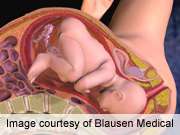For women threatened with preterm labor, maintenance tocolysis with nifedipine is not associated with a significant reduction in adverse perinatal outcomes, according to a study published in the Jan. 1 issue of the Journal of the American Medical Association.
(HealthDay)—For women threatened with preterm labor, maintenance tocolysis with nifedipine is not associated with a significant reduction in adverse perinatal outcomes, according to a study published in the Jan. 1 issue of the Journal of the American Medical Association.
Carolien Roos, M.D., from the Radboud University Medical Center in Nijmegen, Netherlands, and colleagues conducted a randomized, double-blind, placebo-controlled study in 11 perinatal units in all tertiary centers in the Netherlands to examine whether maintenance tocolysis with nifedipine would reduce adverse perinatal outcome linked to premature birth. Women with threatened preterm labor between 26 and 32 weeks of gestation, who had not delivered after 48 hours of tocolysis and a completed course of corticosteroids, were randomized to oral nifedipine (201 women) or placebo (205 women) for 12 days. Surviving infants were followed for six months.
The researchers observed no significant between-group difference in adverse perinatal outcome (11.9 percent for nifedipine versus 13.7 percent for placebo; relative risk, 0.87; 95 percent confidence interval, 0.53 to 1.45).
"It seems likely that the absence of any effect is not due to ineffectiveness of nifedipine as a uterine relaxant," the authors write. "Apparently, symptomatic treatment of uterine contractions with any uterine relaxant is ineffective when used as maintenance therapy. The etiology of threatened preterm labor is multifaceted and includes subclinical intrauterine infection. Future research should be directed toward therapies tailored to the specific underlying causes of preterm labor."
One author disclosed a financial tie to CSL Behring, and one author reported provision of expert testimony to courts, payment for lectures, and private/unrelated stock/stock options.
More information:
Abstract
Full Text (subscription or payment may be required)
Journal information: Journal of the American Medical Association
Copyright © 2012 HealthDay. All rights reserved.


















